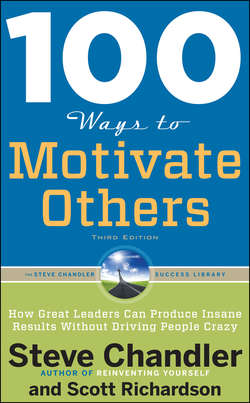Читать книгу 100 Ways to Motivate Others: How Great Leaders Can Produce Insane Results Without Driving People Crazy - Scott Richardson - Страница 6
2. Teach Self-Discipline
ОглавлениеDiscipline is remembering what you want.
– David Campbell, founder, Saks Fifth Avenue
The myth, which almost everyone believes, is that we have self-discipline. It’s something in us, like a genetic gift, that we either have or we don’t.
The truth is that we don’t have self-discipline; we use self-discipline.
Here’s another way to put it: self-discipline is like a language. Any child can learn a language. (All children do learn a language, actually.) Any 90-year-old can also learn a language. If you are 9 or 90 and you’re lost in the rain in Mexico City, it works when you use some Spanish to find your way to warmth and safety. It works.
In this case, Spanish is like self-discipline. You were not born with it. But you can use it. In fact, you can use as much or as little as you wish. And the more you use, the more you can make happen.
If you were an American transferred to Mexico City to live for a year and needed to make your living there, the more Spanish you used the better it would be for you. If you had never used Spanish before, you could still use it. You could open your little English/Spanish phrases dictionary and start using it. You could ask for directions or help right out of that little dictionary! You wouldn’t need to be born with anything special.
The same goes for self-discipline. Yet, most people don’t believe that. Most people think they either have it or they don’t. Most people think it’s a character trait or a permanent aspect of their personality. That’s a profound mistake. That’s a mistake that can ruin a life.
Listen to how people get this so wrong: “He would be my top salesperson if he had any self-discipline at all,” a company leader recently said. “But he has none.”
Not true. He has as much self-discipline as anyone else does; he just hasn’t chosen to use it yet. If the person you lead truly understood that self-discipline is something one uses, not something one has, then that person could use it to accomplish virtually any goal he ever set. He could use it whenever he wanted, or leave it behind whenever he wanted.
Instead, he worries. He worries about whether he’s got what it takes, whether it’s in him, whether his parents and guardians put it there. (Some think it’s put there experientially; some think it’s put there genetically. It’s neither. It’s never “put there” at all. It’s a tool that anyone can use. Like a hammer. Like a dictionary.)
The good news is that it is never too late to correct that mistake in yourself and your people. It’s never too late to learn the real truth. Enlightened leaders get more out of their people because they know that each person already has everything it takes to be successful. They don’t buy the excuses, the apologies, the sad fatalism that most non-performers skillfully sell to their managers. They just don’t buy it.
